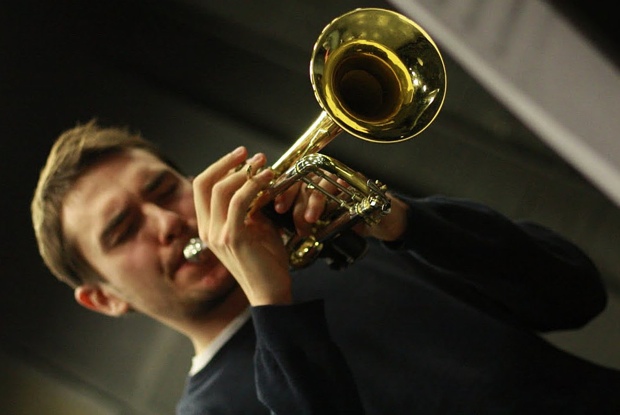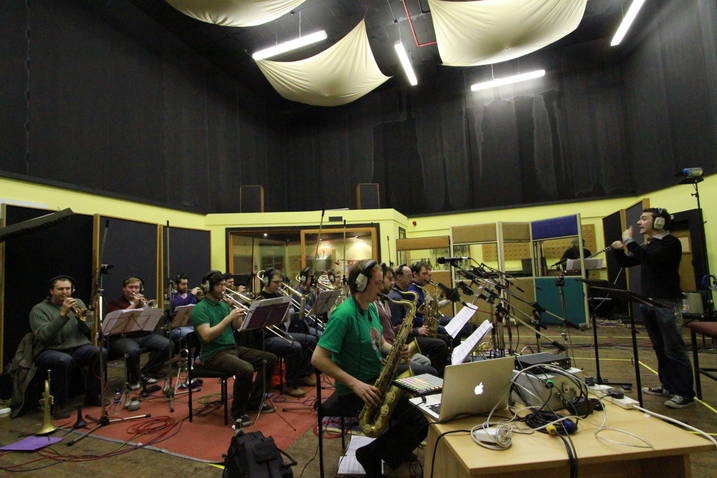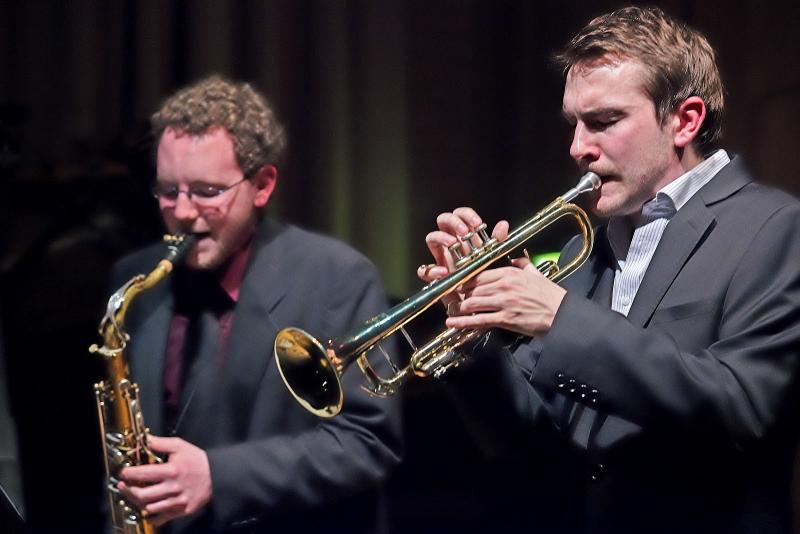Home » Jazz Articles » Profile » Jack Davies: Inventing Himself
Jack Davies: Inventing Himself

and producer of The Jack Davies Big Band (V&V, 2012).
The jazz big band is a wondrous beast. Caught in movement and it's like a big cat, with barely contained violence ready to strike. It can be subtle; smooth, even, but when it rolls over and acts all coy and gentle, watch out. Get too close and it will scar you for life.
Just 26 years old and a graduate from two of Britain's top music academies, trumpeter/composer Jack Davies knows this already. His Jack Davies is a stellar ensemble of young and not quite so young talents ranging from tenorist Josh Arcoleo and guitarist Alex Munk to trumpeter Nick Smart and alto saxophonist Martin Speake. But then it takes more than fine soloists to make great big band music and the orchestra's eponymous debut is just that. Produced by composer/bandleader Colin Towns, this is scarily mature music. This band is a beast and the music it dances to strikes hard and deep.
It was whilst doing his post-grad at London Royal Academy of Music that Davies won the Deutsche Bank Award for Performance and Composition. Winning that prize has enabled him to set up his own label, V&V Music, and release not one but three debut CDs this year.
"The Deutsche Bank runs the prize at a few different conservatoires," says Davies. "You get £10,000, a business mentor and training course to help you set up a creative enterprise. For me that was about recording these three records and setting up my own label."
Davies studied classical music at the Royal Northern College of Music in Manchester, where he won the Goronwy Evans Brass Prize. He brings to jazz an intriguing mixture of inspirations, which shows in the sheer breadth and variety of music featured on The Jack Davies Big Band, Southbound and Flea Circus.
"I'm a massive fan of Ellington," says Davies. "That was one of the first things I was exposed to and what intrigued me was how he would write these almost concertos and pieces with no improvisation at all for big bands. And sometimes he would voice things across sections rather than having trombone or saxophone voicings. He'd blur the lines more—because he was writing so much for individuals. That's what I try to do and, with a band so full of incredible musicians, I know their playing well enough to know what they like doing and what they don't. So, I try to give them things they enjoy playing and give them their freedom in that way."
From the classical side of his training, comes an emphasis on structure and architecture that allows for a coherence and unusual integrity in his music, albeit one that never obstructs the primal, bestial potential of the jazz.
"I want to get away from the jazz tradition of head-solo-head and shout chorus and backing," Davies explains. "So, from a structural point of view, there's more of an influence from classical music. And I draw on my experience of sitting in orchestras in how use the brass section. The sounds I use are more those you get with classical brass. That's also something that [pianist] Peter Saberton did. I played with him as part of the London Jazz Orchestra a few times and I was able to get inside of that music. His music is quite classically-influenced in some ways and I think he influenced me in certain ways."
It's fascinating that one of Davies' heroes is the American maverick composer Charles Ives, someone that he compares—with due deference to both—with a favorite rock band, The Descendents.
 "It's true," he says. "I'm a big fan of Charles Ives. When we did the album launch, we did an arrangement of three Ives songs that seemed to work really naturally with the rest of the set. That showed, more than I'd realized, how that writing had affected me. Strangely enough, his music reminds me of a punk band I was into in my teens [laughing] called The Descendents, which then became the band, All. They will have several normal length tracks and then a couple that are just a few seconds long. Ives does exactly the same thing in some of his pieces. The middle movement of a suite will be traditional length but the first will be twenty seconds long. It's quite playful and sounds incredibly modern given how old it is."
"It's true," he says. "I'm a big fan of Charles Ives. When we did the album launch, we did an arrangement of three Ives songs that seemed to work really naturally with the rest of the set. That showed, more than I'd realized, how that writing had affected me. Strangely enough, his music reminds me of a punk band I was into in my teens [laughing] called The Descendents, which then became the band, All. They will have several normal length tracks and then a couple that are just a few seconds long. Ives does exactly the same thing in some of his pieces. The middle movement of a suite will be traditional length but the first will be twenty seconds long. It's quite playful and sounds incredibly modern given how old it is."Colin Towns, the album's producer, was a big help in making the big band CD and Davies joined Towns' Mask Orchestra for a performance of the composer's Visions of Miles at Ronnie's last fall.
"At the Royal Northern, they bring in guests to play with the big band and Colin was one of those," says Davies. "My big band in Manchester was doing a support set before the main gig and I asked Colin if he'd check it out. He came down and was just really lovely and helpful ever since. He's a very inspirational guy, musically and career-wise and in terms of the kind of mindset you need to do these kinds of projects. He looked at my scores before we went into the studio and made some useful suggestions—'Maybe change this,' 'Don't think like this, try it this way.' And he's a massive Ellington fan. He says that if ever he's not sure he asks himself, 'what would Ellington do?' But also, he says he listens to more classical music than jazz these days. So, there's that link as well."

The second half of the CD is taken up by Davies' "1984 Suite." In less gifted hands, the composition and recording of a suite this young might seem arrogant, but Davies and his band pull it off beautifully.
"A few people have asked whether it's a programmatic work based on the book and it isn't," Davies explains. "It's more about mood. I wrote a few things quite close together when I'd just finished the book and it seemed to tie it together. So, I started to think about it as a suite. There are three band movements and two solo ones. The first of those is Joe Wright, with solo saxophone and electronics. I just gave him a rough idea that I wanted him to get from this point to that point and to do his thing and it was really perfect. He'd read the book as well and I couldn't have written it any better. The second is the passage in the book where they're in a field and think they've escaped. They think they've beaten the system and then they see a radio microphone in a hedge and see this thrush, knowing then the bird is free but they'll never be. For that bit, I robbed a Olivier Messiaen technique and transcribed a bit of thrush song. Tom Taylor, when he did his final at the Royal Northern, played some of Messiaen's solo piano pieces, so that is probably why I wrote that for him in that way."
Expectations are raised in the tracks that precede the suite, with the lovely Ives-like opener, "Entropy," a standout. "1984 Suite," however, surpasses these expectations. "Telescreen," for example, features some of the most full-blooded guitar, from Alex Munk, heard on a jazz album this year, and Jon Ormston's drums are truly heavy. As for "If There's Hope," with Joe Wright's tenor and electronics, it's bleak and yet profoundly touching as well.
After the Royal Northern, the prospect of a career in classical music was a real option, but it was jazz that beckoned. It wasn't the discipline that put him off but rather the years of feeding a very different beast before being allowed to do his own thing.
"When I was at school, I wanted to be an orchestral trumpet player, but the more I did it the more I saw how terrifying it was and that it wasn't what I was cut out to do," says Davies. "I mean, it's an incredible thing these guys do but I'm a bit too rebellious to sit in an orchestra and play music that other people have written for my whole life. I want to have a bit more control over what I'm doing."
 By his second year at the Royal Northern, Davies and his friends where gigging around Manchester and the trumpeter knew where he was headed. His first stop after the RNCM was the Royal Academy of Music, just a few doors down from London's greatest venue, the Royal Albert Hall.
By his second year at the Royal Northern, Davies and his friends where gigging around Manchester and the trumpeter knew where he was headed. His first stop after the RNCM was the Royal Academy of Music, just a few doors down from London's greatest venue, the Royal Albert Hall."It seemed really natural because there were lots of things that I didn't have together," he says. "Like we talk about language and that's a big thing for me because it wasn't part of my experience musically and I needed to know how to do it and how jazz harmony worked. So, it was incredible studying with people like Pete Churchill and Nick Smart to sort that side of things out."
With the Deutsche Bank grant in place, Davies chose to release three records in quick succession. The Big Band, we've met already. Southbound and Flea Circus are both album titles and the names of the two bands. It is here that fans get to hear the gorgeously pure, classical sound of Davies' trumpet and music of another kind altogether. After the expansiveness and rhythmic and timbral complexity of the big band, both Flea Circus and Southbound clearly owe as much to European art and folk traditions as to jazz.
"I suppose with Flea Circus the most obvious influence is Dave Douglas," Davies explains. "His records Charms of the Night Sky (Winter&Winter, 1998) and A Thousand Evenings (RCA/Bluebird, 2000) have a very similar band of trumpet, violin, accordion and bass. My thing is more classical than his because he has come so much more out of the jazz tradition, but I really like the older European jazz tradition as well. It's really taken forty or fifty years for Europe to come to terms with what it was doing back in the forties, which is being in touch with a tradition that is closer to its own folk music, and I think that's really interesting. I enjoy those sounds and it feels natural for me. Flea Circus was a big turning point for me in having a band where I wasn't trying to do jazz mode or classical mode but it was more like a play. I would write things that contained elements of both, bits of improvising perhaps alongside things that were more classically phrased."

And yet, Douglas also references Webern and Stravinsky as informing his work.
"Yes that's true but, with Dave Douglas, he's quite clear that he's an American and grew up in that tradition playing with [pianist] Horace Silver's band," Davies responds. "It's a real living link. Whereas with me—if I'm honest—it's been half-and-half during my development. I definitely feel closer to jazz but I don't feel as tied to the American jazz tradition as some people. It's a beautiful thing but it's not really where I'm coming from."
Again, even a cursory listen to Southbound confirms a similar European art music feel. Here, however, there are echoes of something older in the forms the group uses.
"Well, we all met at the Royal Northern studying classical music," Davies explains. "We all bring compositions along because we found that the most natural place for it is with compositions and then improvisation around it. There was a chamber music module at the Royal Northern and we used to do that band for that. Maybe you can hear some of that [laughs]. Obviously, we don't claim to be a classical chamber group."
But listening to Southbound, there are hints or echoes of early music and the baroque era.
"With Southbound, we use very simple harmony," he continues. "Everything is written contrapuntally and, with the improvisations, there are no chord symbols. So, it's conceived more within a classical way of thinking about things, anyway. That's something going back to very early counterpoint, things like Palestrina, which is in line with what some other 21st century composers are doing as well. That's probably why it sounds more from that place. And Tom Taylor, the pianist, the big influence on him comes from contemporary classical composers."
Flea Circus is a lovely record on which Davies' beautifully controlled tones combine to perfection with Rob Cope's clarinet, Aidan Shepherd's accordion and James Opstad's double bass. Rich in atmosphere, it is one of those albums that has its own sense of time and place. Southbound is another kind of creature again. In some ways, approached from a jazz point of view, it's the more difficult of the three releases. But it's also an intriguing set, one that seems to suggest whole new vistas for the group, and for Jack Davies, in each of its nine sketches. Davies's vision for his music is already remarkably mature but one of the most exciting aspects of his work to date is the myriad possibilities that each record contains for his future development. There's no doubt that that crucial jazz impulse is present in Davies. He will continue to invent and reinvent himself; though, for the present, it's a time for taking stock and reflection.
"At the moment, I'm enjoying doing some gigs," he says. "I want to let the music develop and write some more and see where that goes. Already, for the big band CD launch, I'd written a few new things I was really happy with, which I feel have gone up a level in my writing. The more I do, the more I hear the band, the more I learn from it. I think I need a year and, once I feel ready, maybe do another one. It's just a really exciting thing to write for. There's so much you can do with it with so many amazing people in it. Then as far as my own playing goes, a similar thing really. Play and when I feel I've got something clear and different to say, I'll do another record."
Selected Discography
Jack Davies Big Band, The Jack Davies Big Band (V&V Music, 2012)
Southbound, Southbound (V&V Music, 2012)
Jack Davie's Flea Circus, Flea Circus (V&V Music, 2012)
Photo Credits
Page 3: Tony Sleep
All Other Photos: Courtesy of Jack Davies
< Previous
Live at the Freight
Comments
Tags
Jack Davies
Profiles
Duncan Heining
Colin Towns
Jack Davies Big Band
Nick Smart
Martin Speake
V&V Music
Pete Saberton
Charles Ives
Joe Wright
Messiaen
Tom Taylor
Southbound
Dave Douglas
Horace Silver
For the Love of Jazz
 All About Jazz has been a pillar of jazz since 1995, championing it as an art form and, more importantly, supporting the musicians who create it. Our enduring commitment has made "AAJ" one of the most culturally important websites of its kind, read by hundreds of thousands of fans, musicians and industry figures every month.
All About Jazz has been a pillar of jazz since 1995, championing it as an art form and, more importantly, supporting the musicians who create it. Our enduring commitment has made "AAJ" one of the most culturally important websites of its kind, read by hundreds of thousands of fans, musicians and industry figures every month.






















